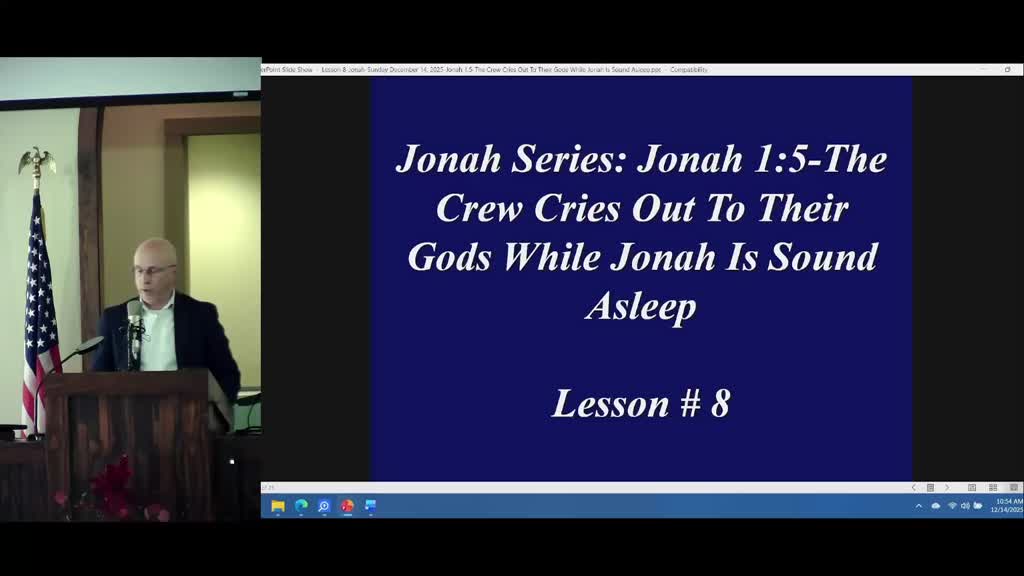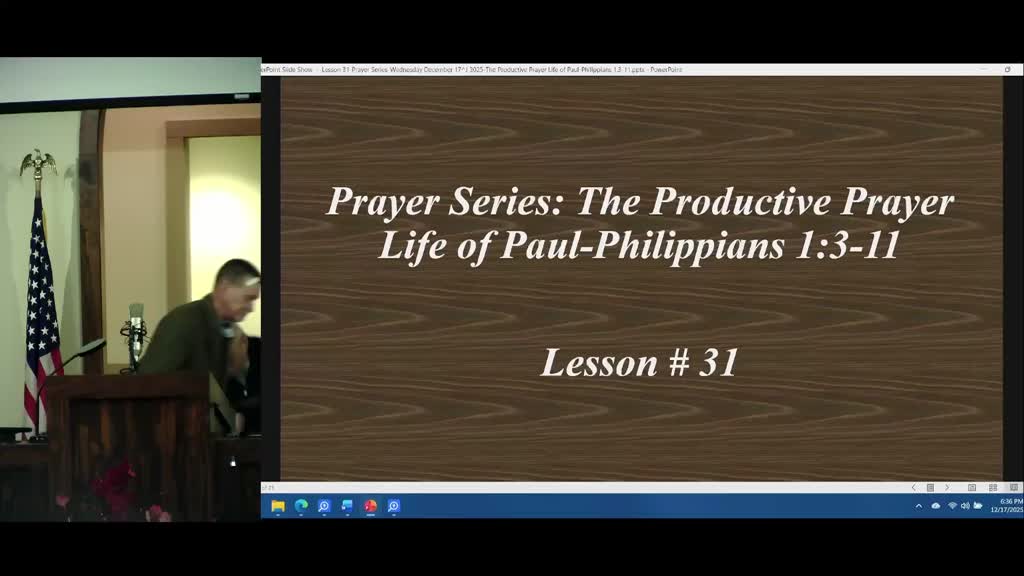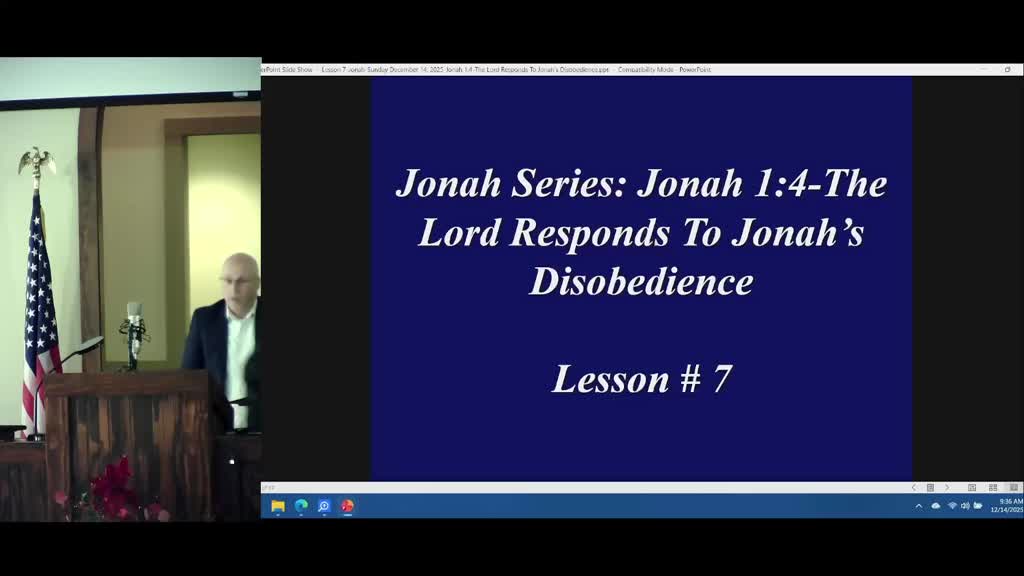Wenstrom Bible Ministries
Church • Huntsville, AL • 1 member • 6 followers
News
Sort by
newest
 Blessed in Believing “Blessed is she who believed, for there will be a fulfillment of those things which were told her from the Lord.” Luke 1:45 In the kingdom of God, believing is a prerequisite to receiving. God spoke to Mary and gave the assurances He always gives when He assigns the impossible to His people. Everything was in place for God to act. Everything waited on Mary to believe Him. Once she believed, it was done! It takes an undivided heart to believe under such circumstances and a pure heart to see God (Matt. 5:8; Heb. 12:14). This has always been God's way with His people. Mary could not see all that had been arranged and assembled in the courts of heaven. She could not see the legions of angels prepared to protect her and her baby. She was unaware of the future and all that she and her child would face. All she knew was that God had spoken to her, and that was enough. So she responded: “Behold the maidservant of the Lord! Let it be to me according to your word” (Luke 1:38). When God speaks about His plans, He does so with everything already in place to fulfill His word. God never speaks hypothetically. He knows exactly what will come to pass. He simply asks you to believe Him. You will experience great blessing when you place your absolute trust in Him. Mary could not have dreamed all that would result from her faithful obedience. Likewise, you cannot possibly imagine all that God has in store for you when you trust Him. He knows exactly what He will do to bring salvation to someone you have prayed for or to heal your friend or to provide for your needs. God has everything in place. Will you believe Him? Blackaby, H. T., & Blackaby, R. (1998). Experiencing God Day by Day. B&H Books.
Blessed in Believing “Blessed is she who believed, for there will be a fulfillment of those things which were told her from the Lord.” Luke 1:45 In the kingdom of God, believing is a prerequisite to receiving. God spoke to Mary and gave the assurances He always gives when He assigns the impossible to His people. Everything was in place for God to act. Everything waited on Mary to believe Him. Once she believed, it was done! It takes an undivided heart to believe under such circumstances and a pure heart to see God (Matt. 5:8; Heb. 12:14). This has always been God's way with His people. Mary could not see all that had been arranged and assembled in the courts of heaven. She could not see the legions of angels prepared to protect her and her baby. She was unaware of the future and all that she and her child would face. All she knew was that God had spoken to her, and that was enough. So she responded: “Behold the maidservant of the Lord! Let it be to me according to your word” (Luke 1:38). When God speaks about His plans, He does so with everything already in place to fulfill His word. God never speaks hypothetically. He knows exactly what will come to pass. He simply asks you to believe Him. You will experience great blessing when you place your absolute trust in Him. Mary could not have dreamed all that would result from her faithful obedience. Likewise, you cannot possibly imagine all that God has in store for you when you trust Him. He knows exactly what He will do to bring salvation to someone you have prayed for or to heal your friend or to provide for your needs. God has everything in place. Will you believe Him? Blackaby, H. T., & Blackaby, R. (1998). Experiencing God Day by Day. B&H Books. “And Isaac went out to meditate in the fields at eventide.” (Gen. 24:63.) WE should be better Christians if we were more alone; we should do more if we attempted less, and spent more time in retirement, and quiet waiting upon God. The world is too much with us; we are afflicted with the idea that we are doing nothing unless we are fussily running to and fro; we do not believe in “the calm retreat, the silent shade.” As a people, we are of a very practical turn of mind; “we believe,” as someone has said, “in having all our irons in the fire, and consider the time not spent between the anvil and the fire as lost, or much the same as lost.” Yet no time is more profitably spent than that which is set apart for quiet musing, for talking with God, for looking up to Heaven. We cannot have too many of these open spaces in life, hours in which the soul is left accessible to any sweet thought or influence it may please God to send. “Reverie,” it has been said, “is the Sunday of the mind.” Let us often in these days give our mind a “Sunday,” in which it will do no manner of work but simply lie still, and look upward, and spread itself out before the Lord like Gideon’s fleece, to be soaked and moistened with the dews of Heaven. Let there be intervals when we shall do nothing, think nothing, plan nothing, but just lay ourselves on the green lap of nature and “rest awhile.” Time so spent is not lost time. The fisherman cannot be said to be losing time when he is mending his nets, nor the mower when he takes a few minutes to sharpen his scythe at the top of the ridge. City men cannot do better than follow the example of Isaac, and, as often as they can, get away from the fret and fever of life into fields. Wearied with the heat and din, the noise and bustle, communion with nature is very grateful; it will have a calming, healing influence. A walk through the fields, a saunter by the seashore or across the daisy-sprinkled meadows, will purge your life from sordidness, and make the heart beat with new joy and hope. “The little cares that fretted me, I lost them yesterday, ………… Out in the fields with God.” Christmas Eve BELLS ACROSS THE SNOW O Christmas, merry Christmas, Is it really come again, With its memories and greetings, With its joy and with its pain! There’s a minor in the carol And a shadow in the light, And a spray of cypress twining With the holly wreath tonight. And the hush is never broken By laughter light and low, As we listen in the starlight To the “bells across the snow.” O Christmas, merry Christmas, ’Tis not so very long Since other voices blended With the carol and the song! If we could but hear them singing, As they are singing now, If we could but see the radiance Of the crown on each dear brow, There would be no sigh to smother, No hidden tear to flow, As we listen in the starlight To the “bells across the snow.” O Christmas, merry Christmas, This never more can be; We cannot bring again the days Of our unshadowed glee, But Christmas, happy Christmas, Sweet herald, of good will, With holy songs of glory Brings holy gladness still. For peace and hope may brighten, And patient love may glow, As we listen in the starlight To the “bells across the snow.” —Frances Ridley Havergal. Cowman, L. B. (1925). Streams in the Desert (pp. 368–369). The Oriental Missionary Society.
“And Isaac went out to meditate in the fields at eventide.” (Gen. 24:63.) WE should be better Christians if we were more alone; we should do more if we attempted less, and spent more time in retirement, and quiet waiting upon God. The world is too much with us; we are afflicted with the idea that we are doing nothing unless we are fussily running to and fro; we do not believe in “the calm retreat, the silent shade.” As a people, we are of a very practical turn of mind; “we believe,” as someone has said, “in having all our irons in the fire, and consider the time not spent between the anvil and the fire as lost, or much the same as lost.” Yet no time is more profitably spent than that which is set apart for quiet musing, for talking with God, for looking up to Heaven. We cannot have too many of these open spaces in life, hours in which the soul is left accessible to any sweet thought or influence it may please God to send. “Reverie,” it has been said, “is the Sunday of the mind.” Let us often in these days give our mind a “Sunday,” in which it will do no manner of work but simply lie still, and look upward, and spread itself out before the Lord like Gideon’s fleece, to be soaked and moistened with the dews of Heaven. Let there be intervals when we shall do nothing, think nothing, plan nothing, but just lay ourselves on the green lap of nature and “rest awhile.” Time so spent is not lost time. The fisherman cannot be said to be losing time when he is mending his nets, nor the mower when he takes a few minutes to sharpen his scythe at the top of the ridge. City men cannot do better than follow the example of Isaac, and, as often as they can, get away from the fret and fever of life into fields. Wearied with the heat and din, the noise and bustle, communion with nature is very grateful; it will have a calming, healing influence. A walk through the fields, a saunter by the seashore or across the daisy-sprinkled meadows, will purge your life from sordidness, and make the heart beat with new joy and hope. “The little cares that fretted me, I lost them yesterday, ………… Out in the fields with God.” Christmas Eve BELLS ACROSS THE SNOW O Christmas, merry Christmas, Is it really come again, With its memories and greetings, With its joy and with its pain! There’s a minor in the carol And a shadow in the light, And a spray of cypress twining With the holly wreath tonight. And the hush is never broken By laughter light and low, As we listen in the starlight To the “bells across the snow.” O Christmas, merry Christmas, ’Tis not so very long Since other voices blended With the carol and the song! If we could but hear them singing, As they are singing now, If we could but see the radiance Of the crown on each dear brow, There would be no sigh to smother, No hidden tear to flow, As we listen in the starlight To the “bells across the snow.” O Christmas, merry Christmas, This never more can be; We cannot bring again the days Of our unshadowed glee, But Christmas, happy Christmas, Sweet herald, of good will, With holy songs of glory Brings holy gladness still. For peace and hope may brighten, And patient love may glow, As we listen in the starlight To the “bells across the snow.” —Frances Ridley Havergal. Cowman, L. B. (1925). Streams in the Desert (pp. 368–369). The Oriental Missionary Society.




